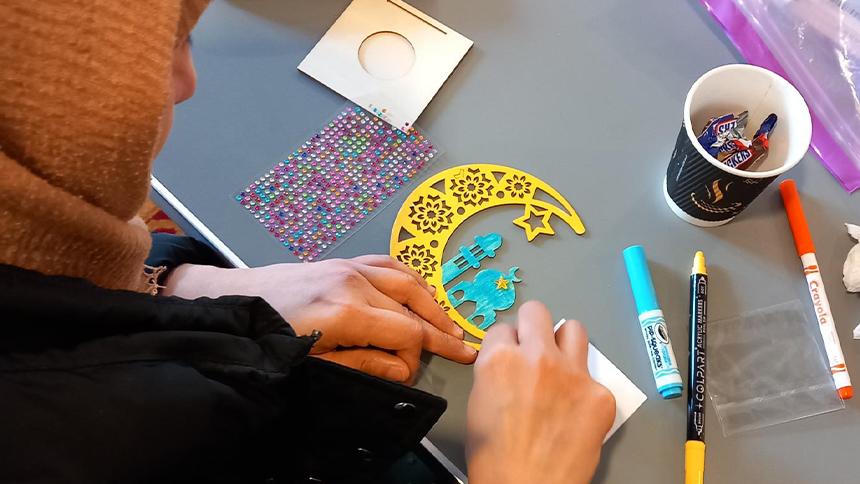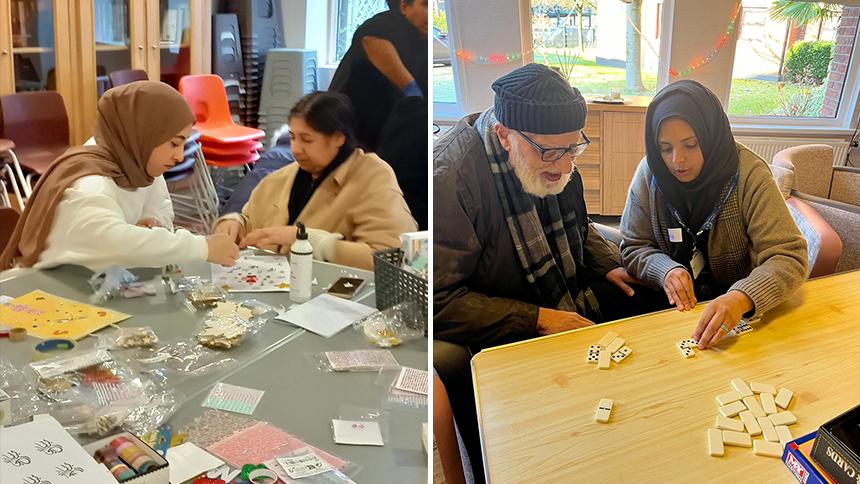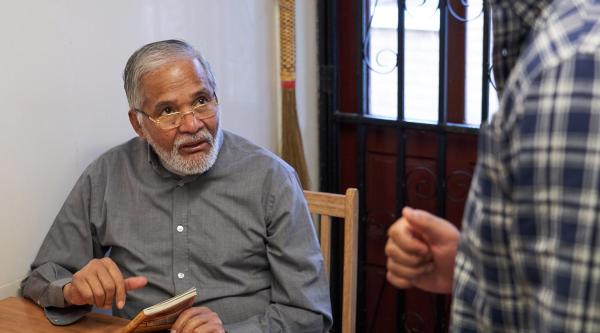Real stories
Developing the right dementia support for South Asian communities in Greater Manchester
Sahara, an Alzheimer’s Society service in Greater Manchester, is making sure people from South Asian communities can get the dementia support they need.
At first, Jamila was nervous about visiting the memory café at Rochdale’s Golden Mosque, but she says it's an essential date in her diary now.
‘The team are so bubbly, they’re angels. When I see them, they lift me up. I’m there every month now and it makes me feel less isolated. They make you feel so special, so at ease. Every person matters.’
The memory café supporting Jamila on her dementia journey is one element of Sahara, launched by Alzheimer’s Society in 2023.
Sahara, which means ‘support’ in Urdu, provides tailored dementia support to Greater Manchester’s South Asian communities.
With a hugely dedicated team working across 10 boroughs, it’s going from strength to strength.

How Sahara started
Sue Clarke, Regional Manager for Greater Manchester, explains how Sahara was initially made possible with the support of an Alzheimer's Society partner. This helped consolidate pockets of work that were already happening.
‘CBRE came to us and they were interested in supporting us with a big project to tackle health inequalities in Greater Manchester and reach out to communities.’
There was one key requirement from the outset – that the team running Sahara should be from South Asian communities.
We knew we needed a team from the community, otherwise people would not want to reach out to our service.
Local Services Manager Sania Rehman has been with Sahara from the very start.
She says getting it off the ground was a mammoth undertaking, and the team immersed themselves in research.
‘We looked at existing services, finding out what was already available, from Alzheimer’s Society and beyond, for the South Asian community and what worked and what didn’t work,’ says Sania.
‘We officially started taking referrals in June 2023 and it’s just never stopped since.’
Barriers in accessing dementia care
Reaching anyone affected by dementia, wherever they live, whatever community they’re from, can be hard enough.
But there are particular barriers for South Asian communities, explains Sania.
‘Although things are going in a positive direction – younger generations are more willing to talk openly about dementia – our community can be very closed,’ explains Sania.
Existing dementia services are often not designed to provide support people in the right ways. For example, language can be a huge obstacle.
The right support
‘English is not the first language of a lot of the older generation.
‘Yes, there may be leaflets and booklets they can access in different languages like Urdu, Punjabi or Gujarati. However, lots of older people might not be able to read or, depending on where they are on their dementia journey, they might have lost their ability to read.’
People with dementia may be labelled as ‘mad’ or ‘possessed’, says Sania.
‘For example, if a person who has dementia with Lewy bodies experiences visual hallucination, it might be associated with possession. Also, with sundowning, this might be seen as a spiritual disease.’
Sadly, the combined impact of these barriers is stark. People from South Asian communities are less likely to receive an early dementia diagnosis and to receive the specialised help and support they need.
What dementia support is available
Sania’s team now comprises three Dementia Advisers – Robana Naqvi, Nabeela Ali and Shagufta Majid – and they have a dedicated volunteer team.
They support people with dementia in their homes and communities, as well as reaching people who are worried about symptoms to help promote early diagnosis.
There are four main ways the team do this, explains Sania.
‘First, we have GPs, healthcare professionals, referring into our services, including memory clinics.
‘Then we have a focus on education and awareness. We do awareness sessions with lots of different groups and organisations. For example, we’ve been to prisons, places of worship and schools.
‘We also have monthly memory cafés – there are three at the moment, in Rochdale, Stockport and Tameside – which are hugely popular.
‘And then our most recent piece is supporting more people to participate in research. We’ve teamed up with Join Dementia Research to start the conversation about research and getting people involved.’

Reducing loneliness and isolation
In just two years, Sahara is clearly making a difference.
A recent evaluation shows that the people it supports have a better understanding of dementia and improved wellbeing. They also feel less isolated and lonely.
Sue is in awe of the team’s energy and dedication.
‘This is a team that makes things happen.
They have crossed those enduring boundaries, encouraged people to come forward and educated lots more about dementia. They have told people that it’s OK to ask for help.
Building trust
Dementia Adviser Nabeela says the team’s ability to build trust has been key.
‘Having someone that speaks your language and understands your faith, your culture, your traditions, your values is hugely important.
You’ve lifted a huge barrier to win their trust. It’s a breakthrough.
‘You’re at a different level with them and they will share with you.’
‘Recently someone said to me at a memory café, “I don’t know what I would do without this group. It feels like home, a safe space for me.” I was so moved by her words,’ says Sania.
As well as doing more in Greater Manchester, the team want to take what they’ve learned to other parts of the country. Their expertise is already being drawn on by colleagues elsewhere.
‘We don’t want to just stay still,’ says Sania. ‘We want to grow, we want to learn.’
Find support near you
From activities and social groups to dementia-friendly transport, our dementia directory can help you find support services local to you.



comments